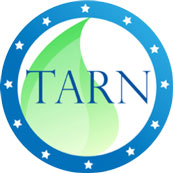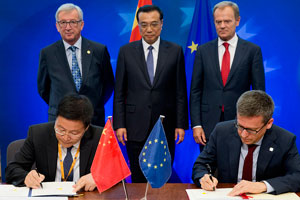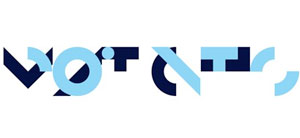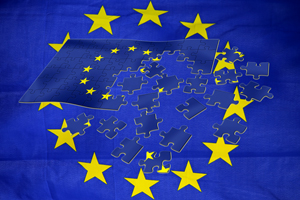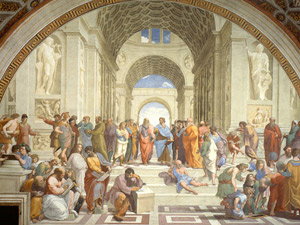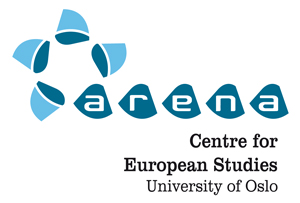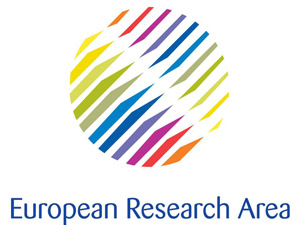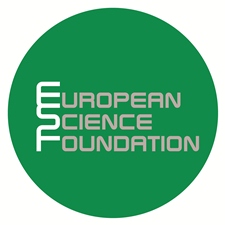Conferences - Page 7
Together with the Centre for European Research (CERGU) at the University of Gothenburg, Guri Rosén at ARENA co-organises an interdisciplinary conference on the TTIP in Gothenburg on 14-15 March 2016. EU Trade Commissioner Cecilia Malmström will hold a keynote address.
Asimina Michailidou and Mauro Barisione organise a workshop on social media and European politics in Oslo on 10-11 March 2016.
The GINE project at the Department of Economics, University of Oslo, is organizing a workshop on Theory and Environment 3-4 March 2016. Registration is required.
ARENA organizes the first workshop of the research network TARN on the agencification of EU governance in Oslo on 1-2 February 2016.
The education and research network on EU foreign policy, ANTERO, will hold its first workshop sessions in Brussels on 9-11 December.
ARENA is among the organisers of the international conference 'Security and Governance in the Globalised Arctic: Nordic and International Perspectives' in Aarhus 12-13 November.
Open to all researchers, clinicians, industry representatives, patient groups and others with an interest in stem cell biology, research and applications.
This workshop analyses the development of a European administrative order, including agencification. Its focus is on how that relates to and reprograms national administrative orders.
This workshop discusses the constitutional and democratic implications of developments within the domain of foreign and security policy. What, if any, is the constitutional identity of the EU in the domain of foreign and security policy? What are the democratic implications of a putative constitutionalisation of this domain?
This workshop focuses on Europe's civil society and on the implications of the crisis. A key assumption is that the crisis politicizes through redistributive conflicts and a ‘new politics of identity’. An important question that is considered is how the Europe of rights and citizenship confronts a Europe of increasing inequalities.
This workshop takes stock of the present status of legal-democratic rule in the EU. What are the implications for democratic arrangements of increased executive dominance and technocracy, as well as more differentiation? Are there any prospects for representative-democratic institutions to ‘fight back’?
What is the state of democratic constitutionalism in Europe today? This open conference will discuss the current status of democracy in Europe, the implications of the euro crisis, as well as implications for Norway as an associate EU non-member state.
The NORCONE project will stage an open half-day conference on affiliated non-members of the EU. The event will take place at the Philanthropy House in Brussels.
As part of the 5th International Conference on Democracy as Idea and Practice, John Erik Fossum will organise a workshop with Andreas Føllesdal on crisis, innovation/experimentation and the governance of European integration.
The contributors to a forthoming book Europe's prolonged crisis: The making or the unmaking of a political Union, edited by Virginie Guiraudon, Carlo Ruzza and Hans-Jörg Trenz, will gather at ARENA in workshop to discuss draft chapters.
ARENA organises a workshop gathering contributors to a forthcoming special issue of Journal of European Public Policy to discuss different visions of Differentiated Integration (DI). The aim is to contribute towards a clear, complete and concise definition of the notion.
The research project EPISTO (Why not epistocracy? Political legitimacy and 'the fact of expertise') will have its kick-off conference at the University of Oslo April 4 and 5 2013. Participation is limited to registered participants.
The European Union has entered the fifth year of a profound existential crisis. What started as an American financial crisis has come to question the very existence of the European Union, and indeed, has revived secessionist tendencies in several of its Member States (in particular Spain and the United Kingdom). Why is this? What is the present status of crisis? The multiple crises facing the European Union speak to the need for radically rethinking the European Union and the way in which decision-makers, intellectuals, scholars, and the public approach it.
The conference presents research on Livelihoods in developing countries and discuss the tensions in the multidiciplinary approaches to protect and promote human well-being.
We welcome you to participate and submit the abstracts for the presentations. The deadline for submitting the abstracts is 26th of October 2012, and we will send a reply if you are going to participate in the conference as soon as we accept it.
The Eurotrans WP1 workshop 'The Transformation of the Executive Branch of Government in Europe: Centre Formation, Administrative Integration and Co-existing Orders'.
The aim of this highly interactive one day event is to develop a research agenda on the European Research Area.
This workshop is part of the project RECODE - Responding to Complex Diversity in Europe and Canada, which is sponsored by the European Science Foundation (ESF).
Addictions to smoking, alcohol, gambling and illegal drugs cause much suffering. Large resources and strong interventions are used every year to discourage and punish these behaviors, as well as treat the underlying addiction.


